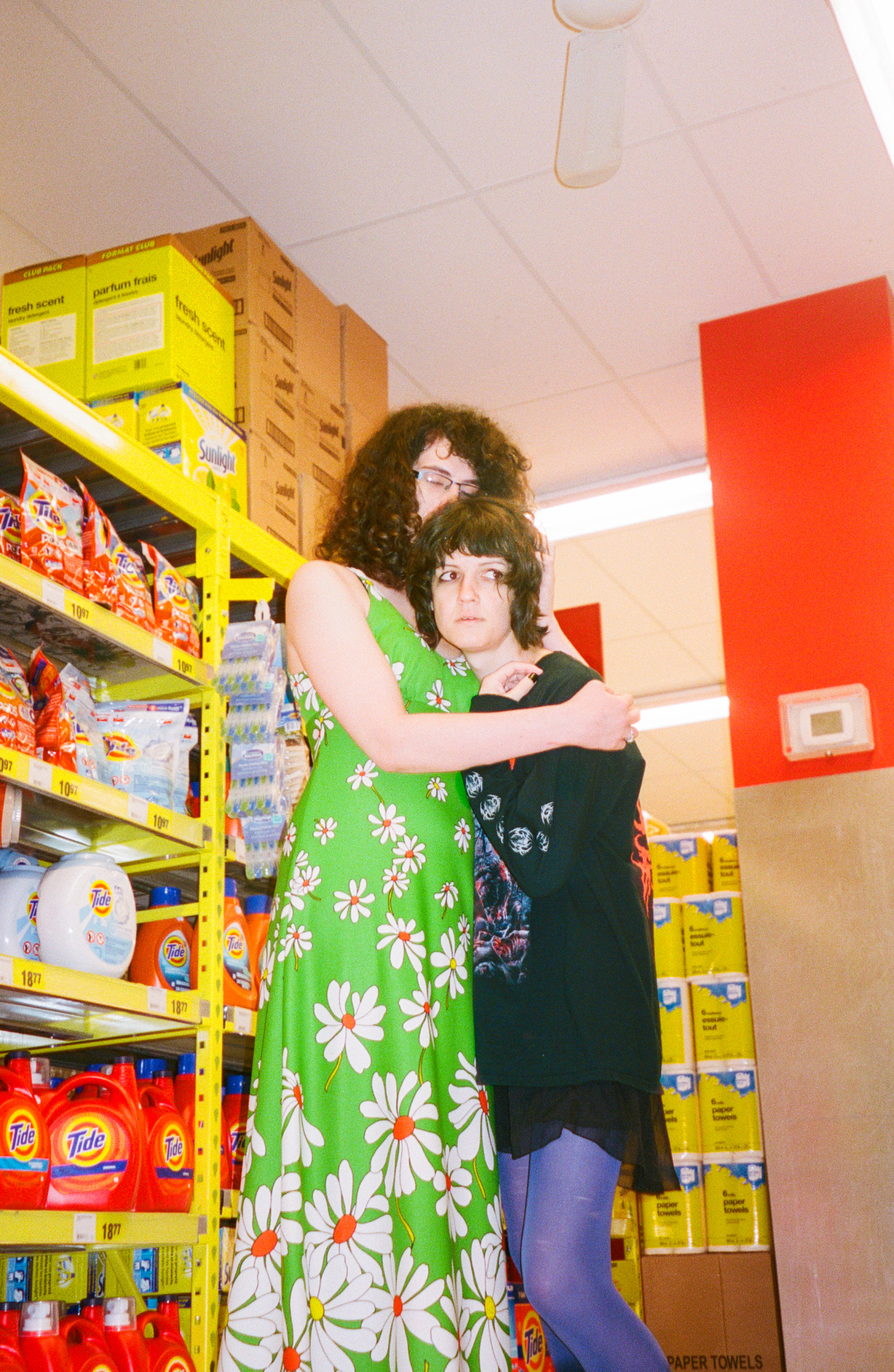
The FADER's longstanding series GEN F profiles emerging artists to know now.
A riot breaks out across WASTEISOLATION, the debut album from Canadian noise pop duo Black Dresses. It’s not the kind that flares up in public, not a propulsive display of collective energy, but a private fury, the feeling that grips you when you want to burn down everything inside your own head and start anew. A collaboration between Dizzy, who records solo as Girls Rituals, and Rook, Black Dresses came together online. The whole album, Rook and Dizzy tell me, was assembled via Twitter DM: one musician would put together a synth loop or a beat and fire it off to the other, who would lay down her vocals or work in a new riff. They recorded this way over a period of three months in late 2017 and early 2018, often working until sunrise, shipping audio files back and forth between Vancouver and Toronto until they had a raw, abrasive, and deliriously catchy album about surviving as trans women in an antagonistic world.
Rook is visiting Dizzy in Toronto when we speak over video chat. It’s only their second time hanging out together in person; they first met IRL late last year when they both happened to be visiting their girlfriends in Oakland, California. (Rook is planning to move to Montreal so she can rehearse with the band without having to cross the continent.) We’re talking hours after the album’s release, which they celebrated on a YouTube livestream, dancing along to their songs in Dizzy’s room. They haven’t slept much since. “We’re running on evil energy from the PayPal money that’s coming in,” Dizzy says. “Capitalist dark magic.”


“It’s very friend-oriented music, even though it’s about isolation.” — Dizzy
Both Rook and Dizzy have made music since before they were teenagers. Rook was homeschooled through high school, and Dizzy dropped out when she was 15; both cite the internet as a reprieve from the isolation they experienced as teens. In the years since they each started selling their own music on Bandcamp in 2015, they’ve turned to it for both emotional and financial survival. “We’re both really serious about music,” Dizzy says. “We do it on our own and we do it with a shoestring budget. It’s do or die.” In a tone that’s more serious-sounding than Dizzy’s wry humor, Rook adds, “If we couldn’t make shit we’d probably be dead.”
Though each has a singular sound in her solo work — Rook's songs seem to spring up from her bold, industrial drum patterns, and Girls Rituals blends playful raps with synth-pop hooks — Black Dresses gives both musicians a chance to push each other past the limits of what they’d be comfortable making alone. “It’s very friend-oriented music, even though it’s about isolation,” Dizzy says. Although they were never in the room together, Rook and Dizzy spurred each other on throughout the making of the album; an especially gritty vocal from Dizzy might encourage Rook to up the stakes during her turn at the mic, for example. “It’s almost compensating for the energy that’s not in the room,” Rook says.
The energy they did generate is palpable across songs like “In My Mouth,” with its raucous bass line that locks teeth with Dizzy’s vocal fry, and “Wound,” on which drums spray shrapnel around Rook’s sullen vocals. These songs recall the sort of chemistry that powers Sleigh Bells or Linkin Park, both of which Black Dresses cite as influences. On the fast-clipped “Thoughts and Prayers,” Rook and Dizzy rap simultaneously over an agitated beat: “Leave us alone / We don’t want to fucking hurt anyone / We just want to feel anything before we’re done.” It’s one of many barbs leveled at a society sick with transmisogyny, a rallying cry for basic human rights — like safety, survival, and being left the hell alone.



Other songs on the album delve into the aftermath of formative trauma, a subject neither Rook nor Dizzy anticipated tackling. “We had a much more lighthearted idea starting out, and it got really personal,” Dizzy says. On the haunted carousel ride that is “Eternal Nausea,” Black Dresses complicate the pop-psychological idea that trauma has an end date. “It’s not like you go back to being who you were — you’re just a different shape and you have to live with that shape,” says Rook. “It’s really hard to take something as heavy as child abuse and turn it into a song,” adds Dizzy. “Sometimes stuff never gets resolved, unfortunately. It doesn’t get resolved and the energy stays around.”
By alchemizing that tension into pop, Rook and Dizzy make music that doesn’t force listeners into an arbitrarily optimistic mindset. “The intention is for people to resonate with it if they’ve been in that dark place,” Dizzy says. “I just want to bring that dancing energy.” Black Dresses’s songs offer comfort and catharsis not because they promise that everything will get better but because they show you how to riot through hell.
